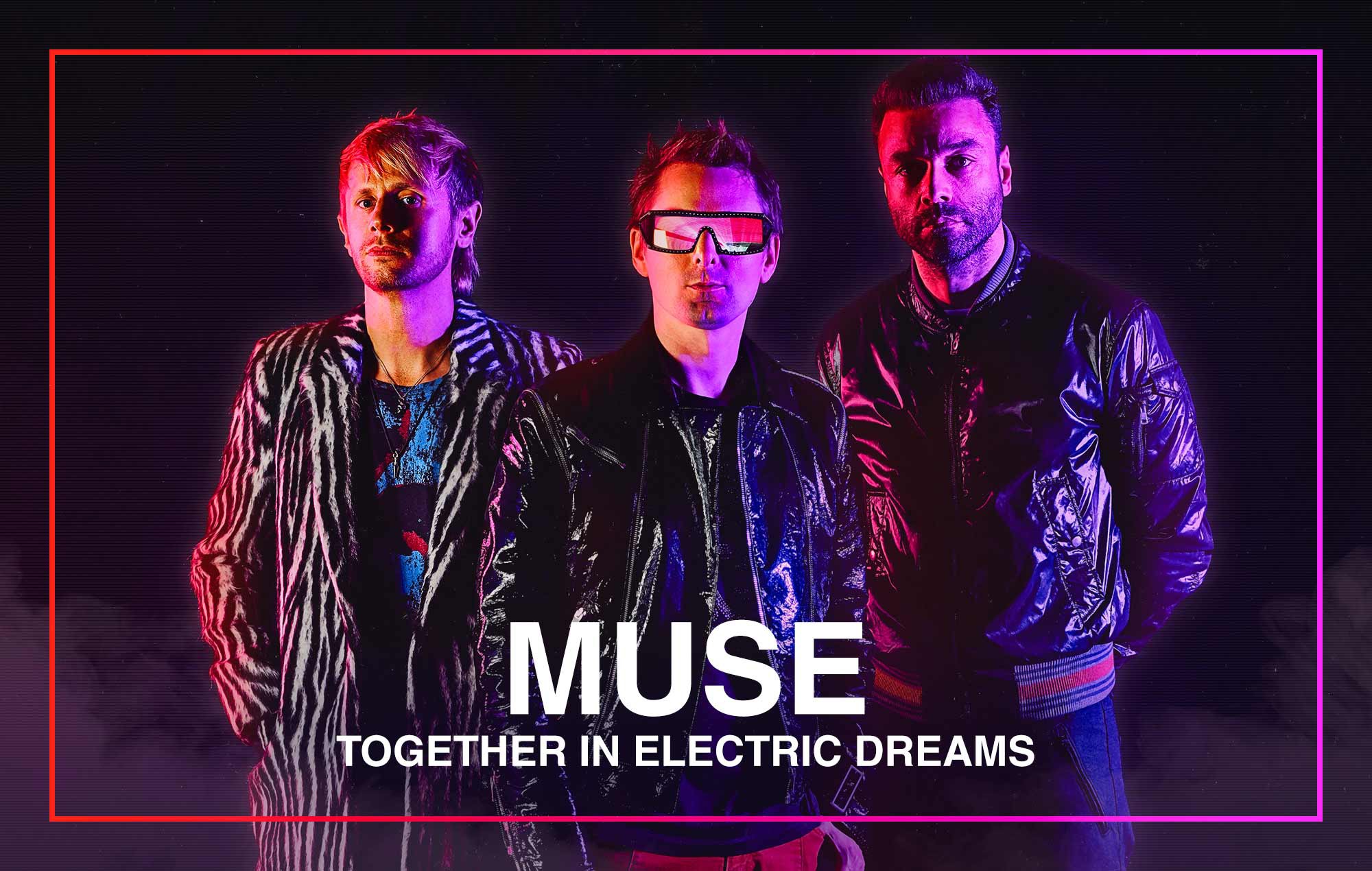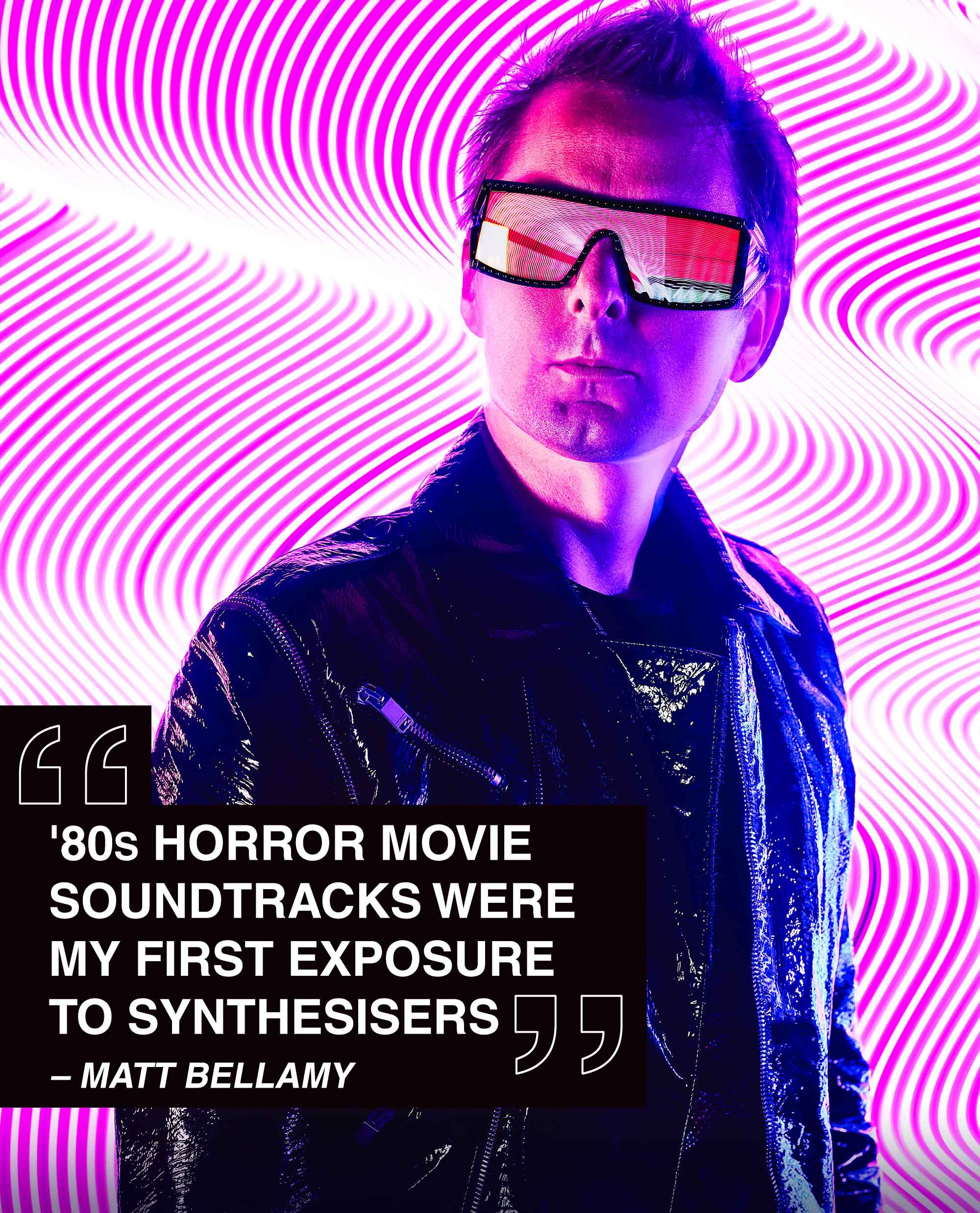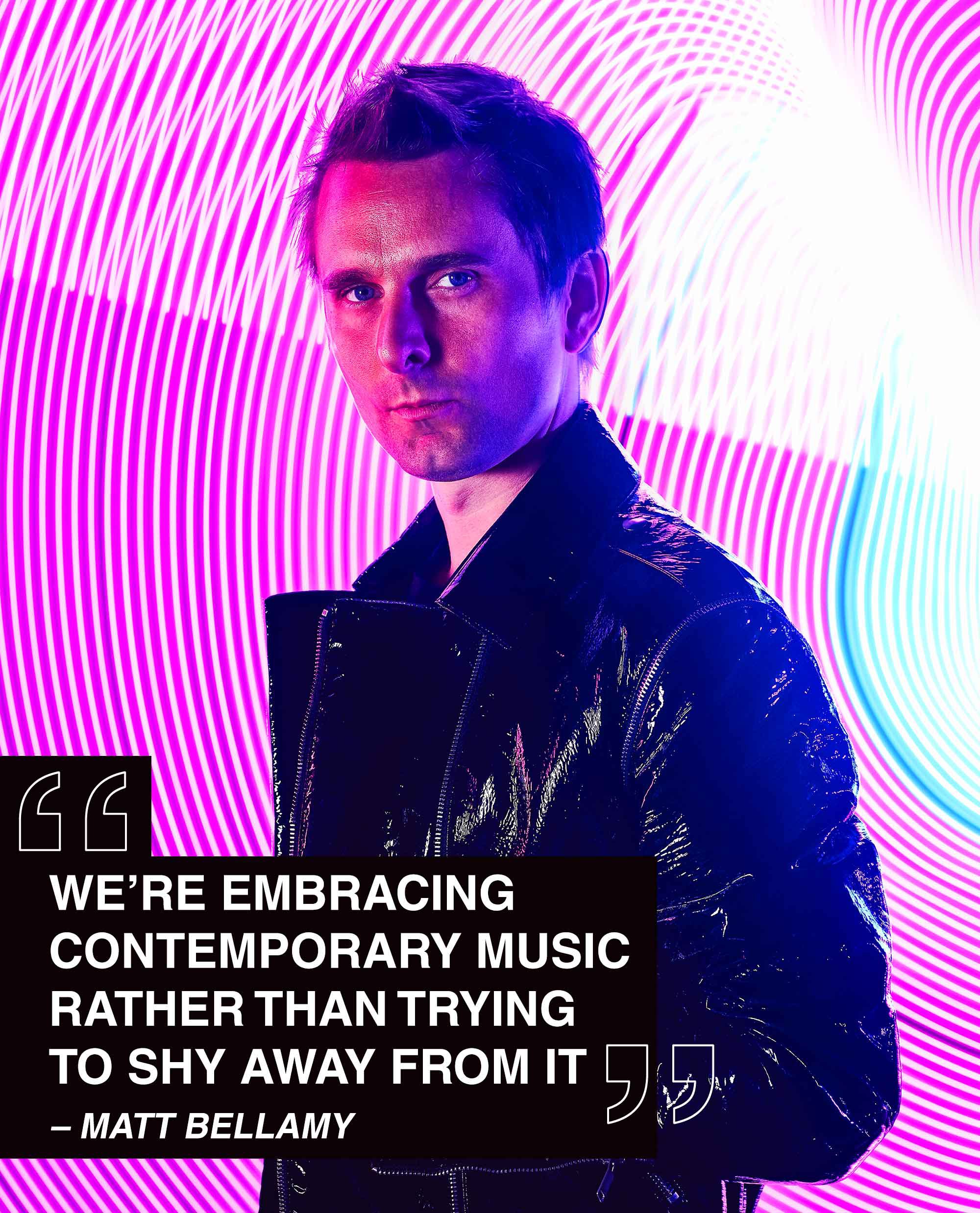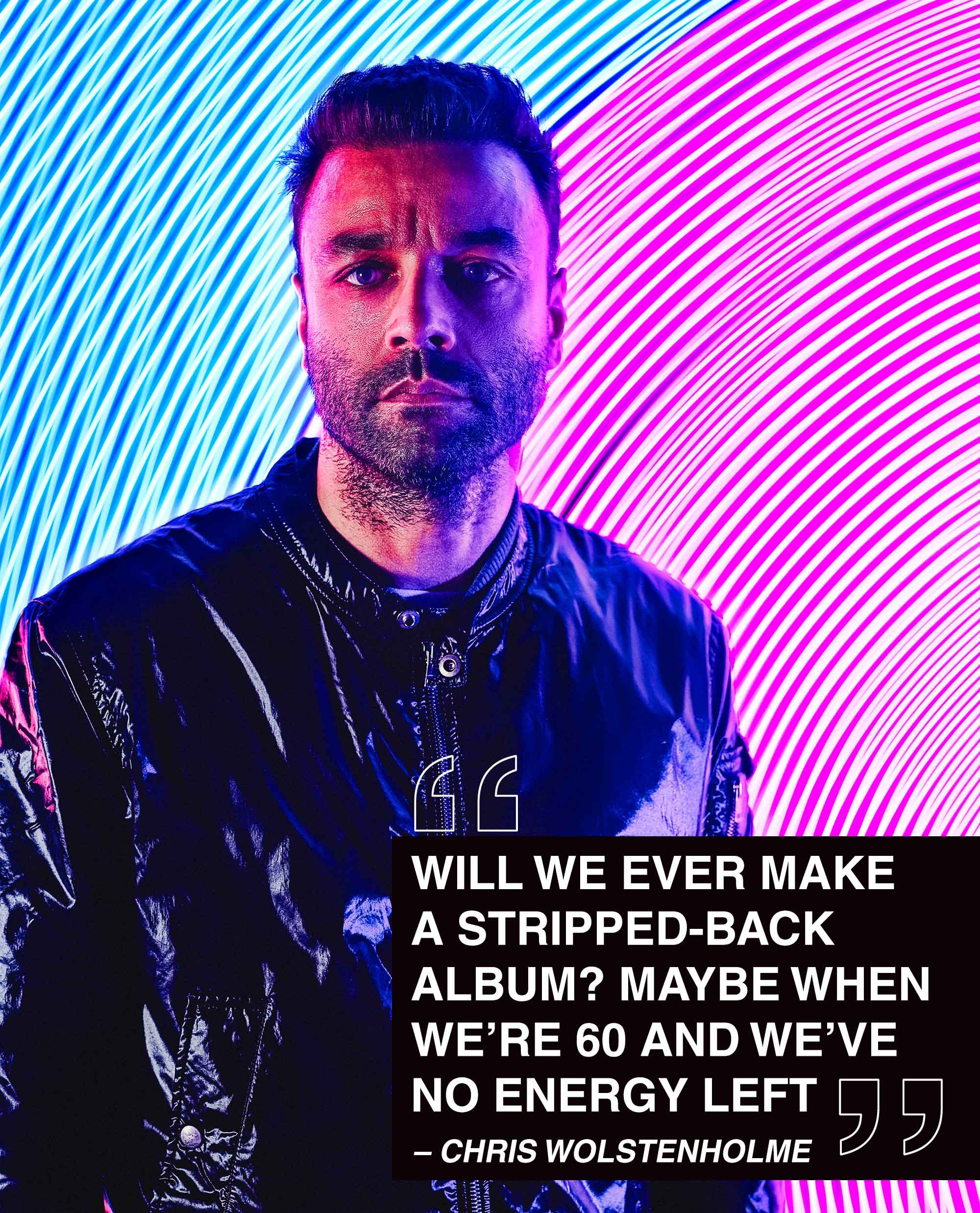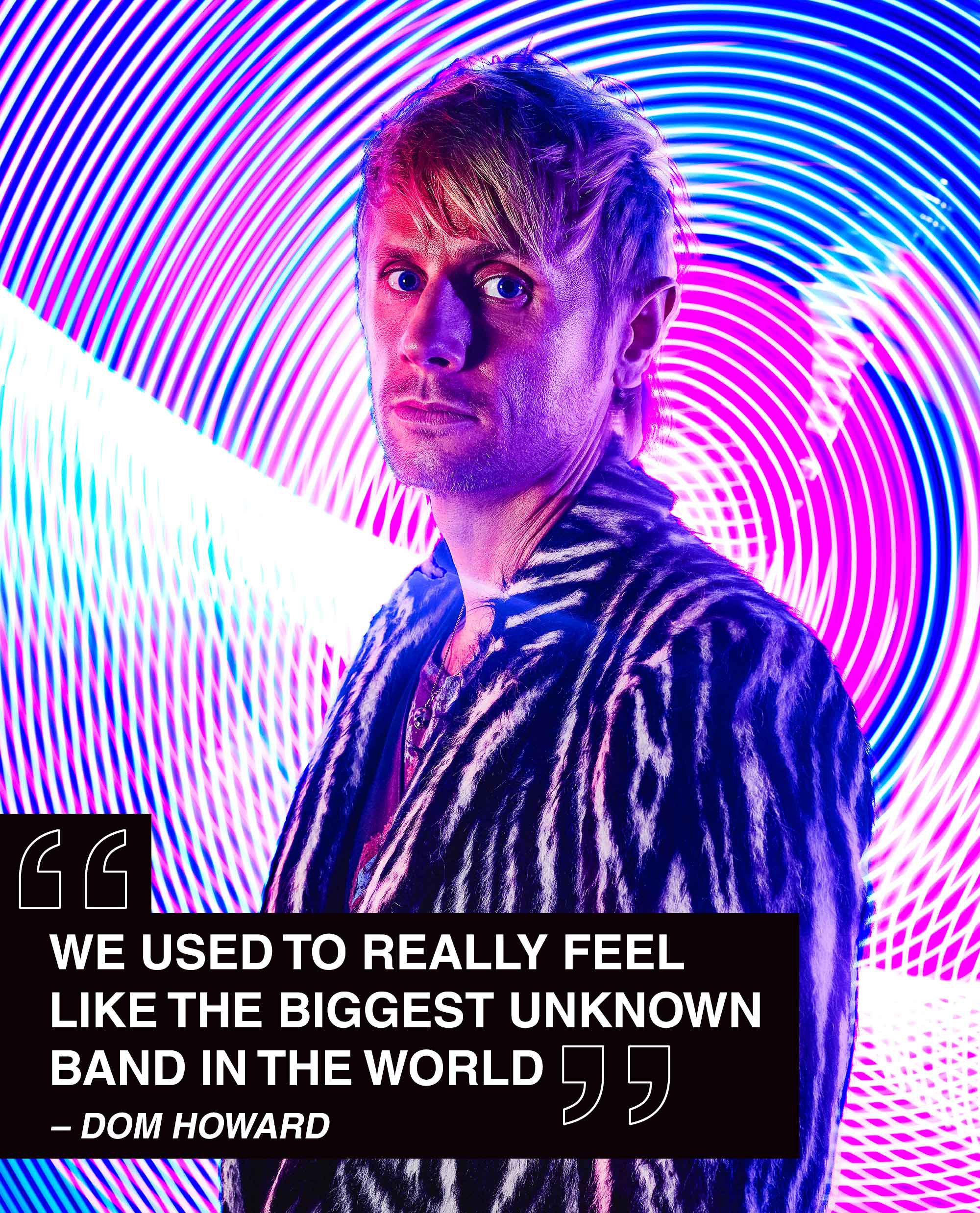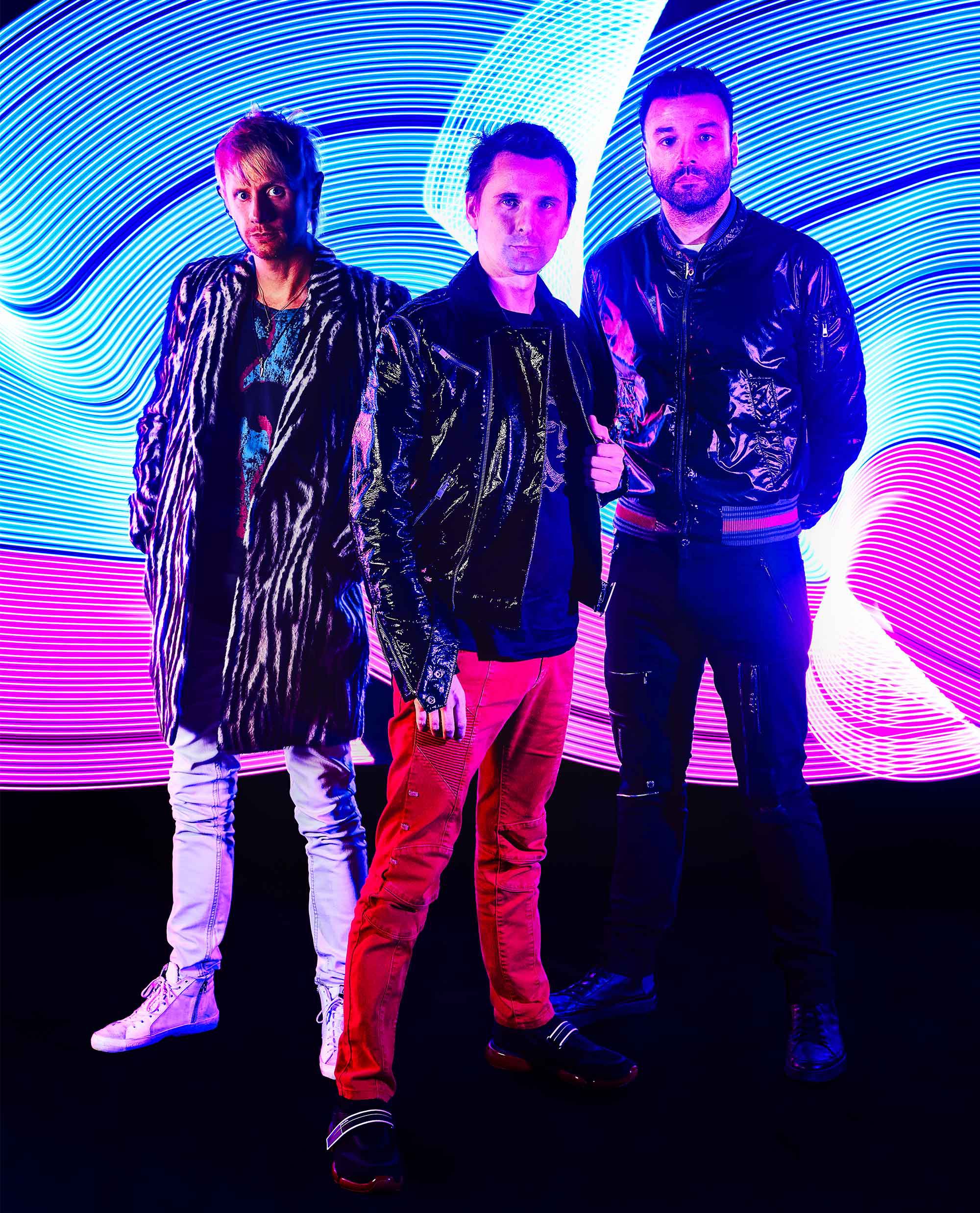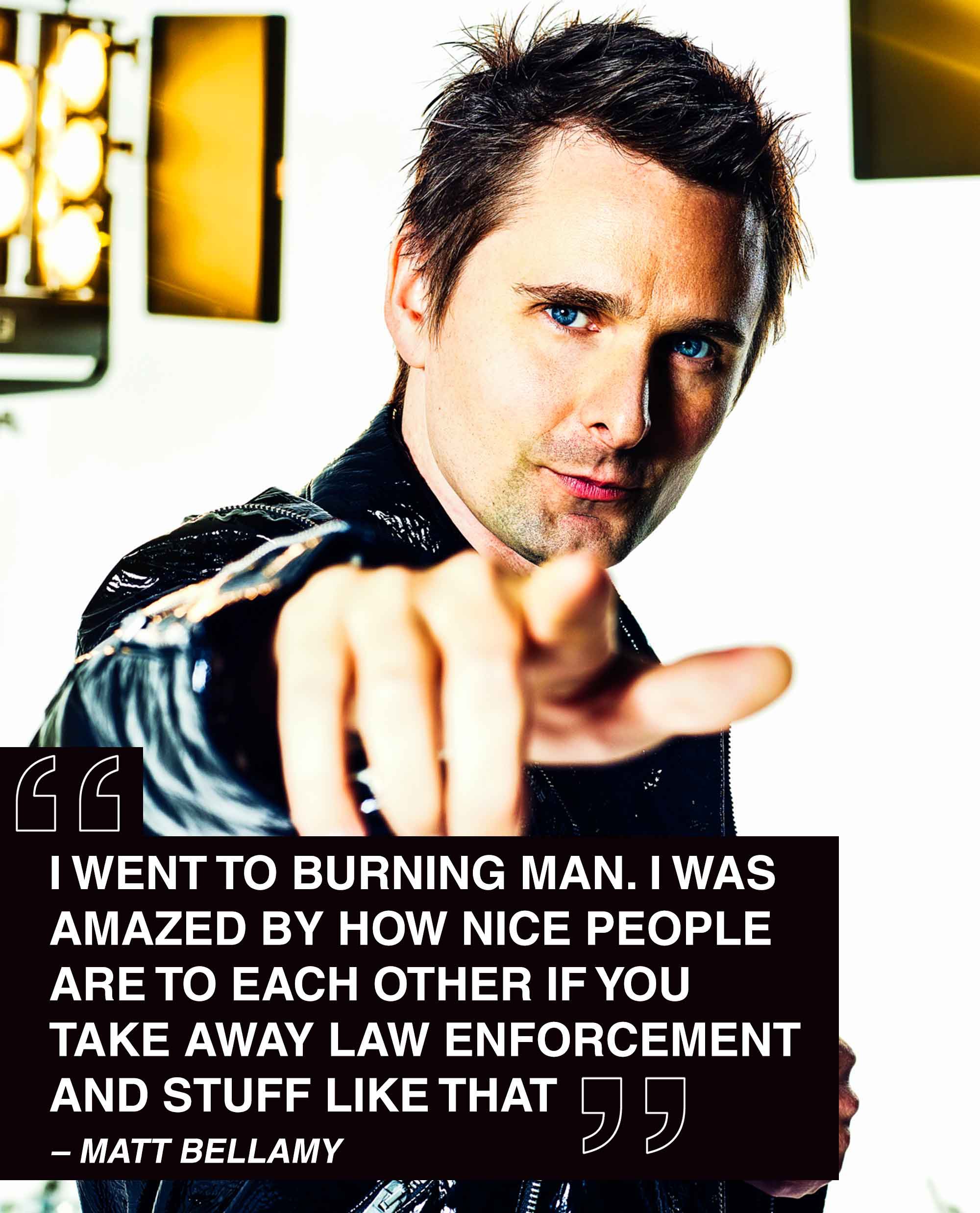
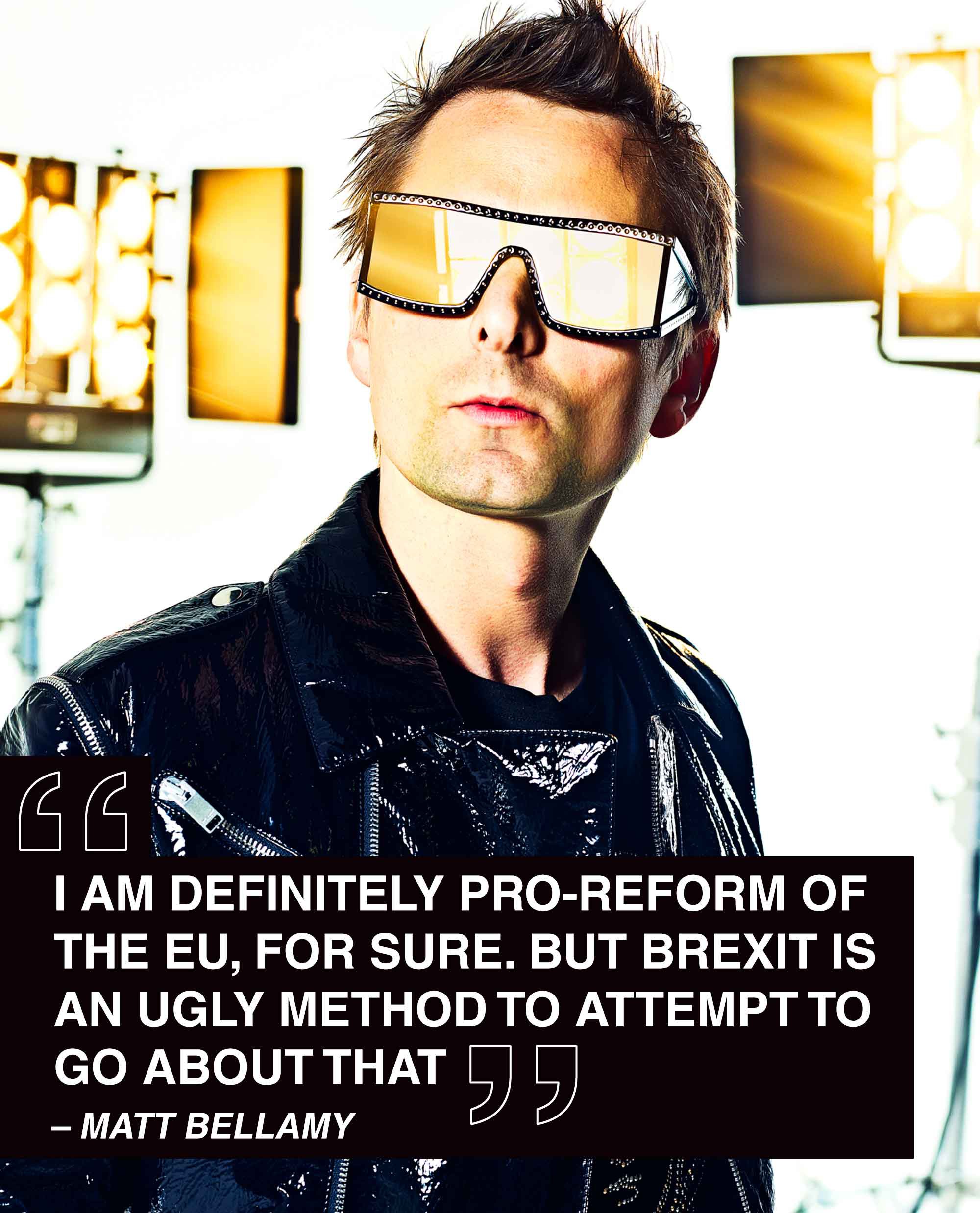
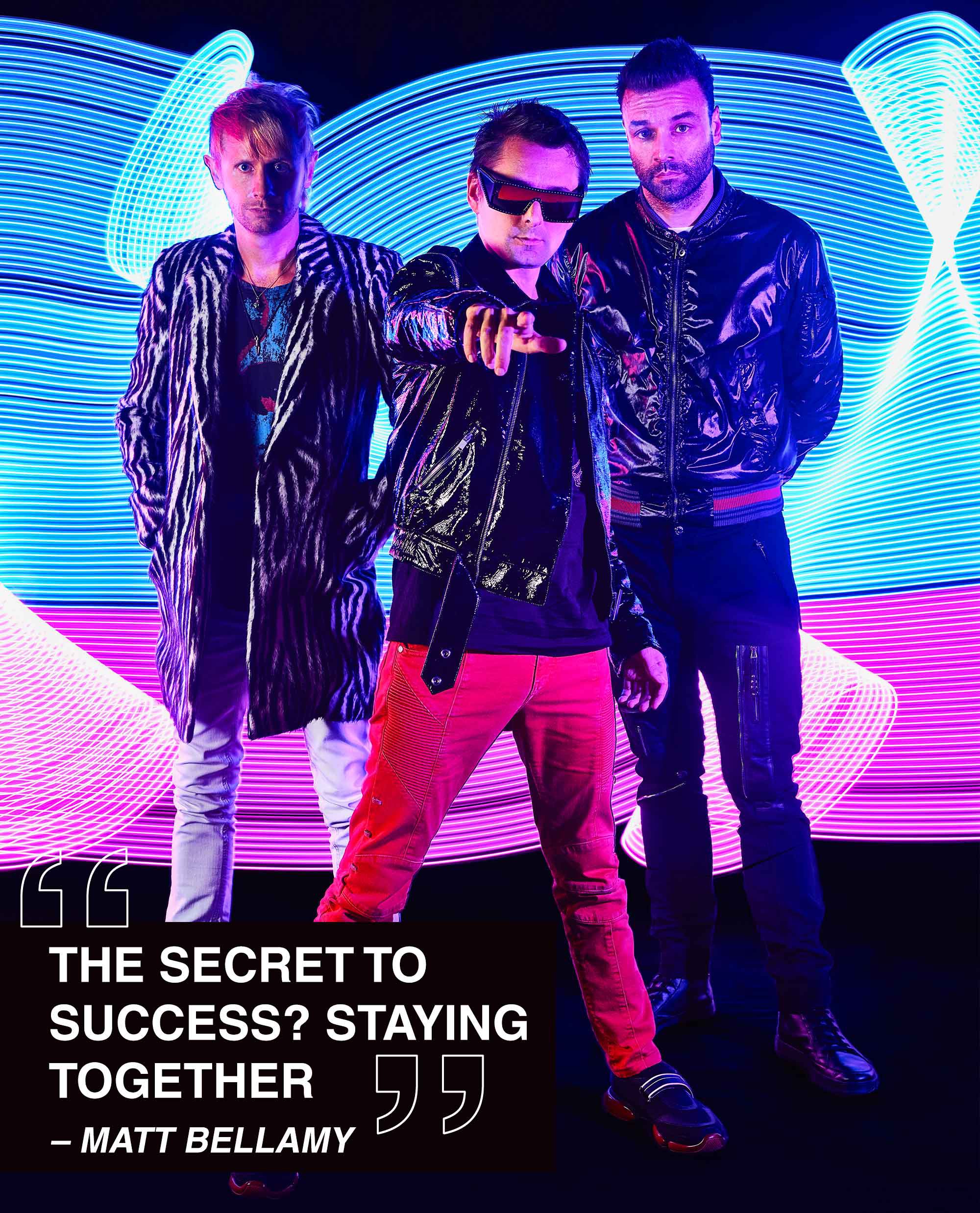
Muse: Together in electric dreams
If life is a video game, Muse are winning. A festival-headlining British rock behemoth, they’ve just released an album, ‘simulation theory’ – their eighth – that cements their reputation as the black mirror beatles. but while vr headsets, visions of the singularity and concerns about autocratic government are worthy distractions, it’s the friendship between the three members that holds the band together, finds Tom Connick.
You know you’ve made it as a band when each member gets to travel to an engagement, separately, in an individual blacked-out Mercedes. And so it is that, over the course of an hour at a North London photo studio, three of the things pull up and spit out a member of Muse, each decked out in clothing it would be fair to call ‘ostentatious’.
Drummer Dom Howard is wearing a zebra print fur coat; bassist Chris Wolstenholme, a skin-tight white polo shirt emblazoned with a cartoon eye pattern. The final member of the trio – enigmatic frontman, guitarist and political mouthpiece Matt Bellamy – is wearing a pair of space-age mirrored shades that cover half his face, and a jacket that resembles an oil spillage in a zip factory. It’s like the Clearance rail at TK Maxx has become sentient.
But don’t be fooled by the solo travel – over the course of a few hours in their company, the threesome, bound together since their teenage years, reveal themselves to still be the firmest of friends.
“So many bands that were our peers in the 2000s are not around anymore simply because they couldn’t stay together,” says Matt. “I don’t think it’s because their music suffered in any way, the reason why some of them aren’t around anymore is that there was an argument within the group and someone fell out, or there’s some ego issue. As time goes on, and on, and on, I do think that staying together is the only thing.”
Muse occupy a strange place in 2018. To some, they’re Nickelback on LSD – a stadium-filling scourge of modern rock’s most pompous excesses. To others, they’re essential – the last vanguard of proper, headline-worthy guitar music. Like a popular yeast-based toast topping, there’s no middle-ground in Muse fandom.
‘Simulation Theory’, their new, eight full-length, is unlikely to sway either party. It’s Muse at their most Muse – an explosive, bells-and-whistles march through electro-rock excess, which features everything from soaring ballads built for Hollywood soundtracks (‘Something Human’, ‘Get Up And Fight’) to electro-metal wobblers that wouldn’t sound out of place in the nu-metal era (‘Break It To Me’). It’s completely off-the-wall, a shape-shifting run through everything that make Muse so… Muse.
Refreshingly enough, the trio are fully aware of their reputation. Bellamy sniggers when I mention their sometimes-heavy-handed penchant for anti-tech, anti-government sentiment, when he calls ‘Simulation Theory’ “more positive” on such matters.
Drummer Dom Howard, meanwhile, rolls his eyes and mutters jokes under his breath when Bellamy dons his mirrored shades for their photoshoot. It’s a quiet level of self-awareness that softens the edges of ‘Simulation Theory’’s most impenetrable moments – from the low-slung, distorted slap bass of ‘Break It To Me’, to the Prince-meets-Prodigy maelstrom of ‘Propaganda’.
When work began on this record back in 2016, Bellamy promised “something a bit more stripped down,” in an Absolute Radio interview. The three of them crack up at the notion. “We booted that plan straight into the water,” smirks Dom. “I think if we did go and strip it back, we might have a similar problem to what we had with [2009 album] ‘The Resistance’,” he says, explaining that the almost decade-old LP was the first time they thought about pulling things right back, only for it emerge as Muse-y as ever. “We find we just want to grab a synth and go –” he breaks off, miming playing a keyboard, and spurts out a noise like a live sheep being put in a blender.
That idea of stripping back was something that came from their earliest sessions, they each explain. ‘Something Human’ was the first track to come together, itself a relatively acoustic number, and a pontification on the nature of touring and homesickness. From there on out, though, they began, well, fucking with it. “From a writing perspective, it started with that in mind,” says Bellamy, “but then I get into the studio and I find that not very exciting – I just want to make loads of weird sounds and stuff.”
“I think it’s some initial reaction to being on the road for a long time, and playing these big rock shows that have been very heavy and involved a lot of technology,” concedes Dom. “It’s like, ‘I just want to sing some Simon and Garfunkel songs with an acoustic guitar’.”
They’re looking for “something new” with each record, says Bellamy of the genre-smashing approach they eventually settled upon – one which lends ‘Simulation Theory’ the feeling of a runaway train, at times, as it roars through drum ‘n’ bass, synth-pop, and countless genres in between. “There’s a little bit of invention going on with this album – embracing contemporary music rather than trying to shy away from it,” he continues, “You can hear that on songs like ‘Propaganda’, which we worked with [pop super-producer] Timbaland on; songs like ‘Get Up And Fight’, which is [Swedish pop songwriter] Shellback; the stuff we do with [longtime collaborator] Rich Costey like ‘Break It To Me’.”
It’s an approach which has led to Muse’s most synth-based album – something that might early-days fans who were drawn to their guitar-heavy arrival might baulk at the idea of – but one that Bellamy himself compares to the likes of ‘Supermassive Black Hole’ and ‘Bliss’; a fusion of electronics and a more guitar-bass-drums tradition; “something that was in-between the organic and the synthetic,” as Bellamy puts it.
“I wouldn’t call it experimental, necessarily,” he shrugs. “For us, it probably was, but in the sphere of music it was just us combining parts of what we’ve learned over the years from being a more traditional rock band, and finding ways to blend that with contemporary music.”
Could they ever strip it back, as promised numerous times now? “There’s always the album that we could turn around and record when we’re 60 and we’ve got no energy left,” adds Chris.
In some regards, ‘Simulation Theory’ is a reworking of the Muse that have come before. Notably, the band refer time and time again to a feeling of positivity and faith in technology – something of a surprise from a band who so recently intoned, “My mother, killed by drones / My sister and brother, killed by drones” (on 2015’s ‘Drones’, naturally). They’ve become pinned as a bit of a musical Banksy in that regard – the Black Mirror of stadium rock.
‘Simulation Theory’, though, goes some way to shifting that focus. The album title itself is a nod to the hypothesis that all of life on Earth is in fact a simulation. So far, so Matrix. But, as Bellamy explains, it’s not meant in a negative regard.
“Sometimes, on albums like ‘Drones’, I express a little bit of… anxiety about how technology’s affecting our lives,” Matt admits. “Growing up as a traditional rock band in the age of the programmer and the coder and all that sort of stuff, there’s been a bit of resistance towards that.”
It was an outlook that exhausted him as time went on. “Being on tour with ‘Drones’ for quite a long time, in that dark message, playing songs like ‘Globalist’ on a nightly basis – when you finish a tour like that, you want to do something different; something a bit more colourful; a bit less anxiety- and negativity-ridden. The song ‘Dark Side’ [on ‘Simulation Theory’] is almost like me singing about the want to get away from those dark thoughts and anxieties.”
It was the chance discovery of Swedish philosopher Nick Bostrom, and his work on super-intelligence and the advancement of artificial intelligence that changed all that. “We’ve all heard the idea that one day computers will surpass human intelligence – they say it could happen in the next 10 years,” Bellamy says. “But what I didn’t know was that, in say 30 or 40 years, if competition keeps speeding up, there will be a time when our ability to create really accurate simulations of the laws of physics, and even the nature of evolution – in the cutting edge of science, these things are already getting into the realms of simulation. It’s easier to study a simulated galaxy formation than to build a spaceship that’s gotta fly for a million lightyears and see one happen.”
For a man whose public image is so based on anti-tech sentiment, it was a surprising ‘eureka’ moment. “It gave me this feeling of, ‘Wow, imagine that – that could be so exciting,” says Matt. “Maybe in 20- or 30-years time, we will be able to explore the laws of physics and how evolution works without any limitations on the human body, or time. Because, obviously, going into space, the human body – we’re not really made for that. But I think the way we’re gonna explore space is through simulation.”
From there, ‘Simulation Theory’ began to take shape, the idea of embracing technology seeping into the music itself and even, in its early stages, the method of release – it was originally intended to be a series of singles, Dom explains, before Arctic Monkeys’ released the single-free ‘Tranquility Base Hotel & Casino’ and Muse were inspired to embrace the album format again, mindful of the fact that albums, largely, facilitate touring.
“There’s an older generation of people who are complaining that artists don’t get enough money – and that’s true, from recordings,” says Dom. “You have to be Ed Sheeran to get some money out of the streaming services, with billions of streams. But it’s a different world, which is fascinating, and I like it.”
“Our industry, the music industry, was one of the first industries to be hit with this buzzword, ‘automation’,” explains Matt. “You hear people talking about automation and AI taking away industries, jobs and so on. That’s something the music industry experienced very early on, and it’s now starting to hit other industries – everything from car manufacturing to military strategic decisions. It’s starting to creep in and threaten a lot of peoples’ jobs. I think that’s why a lot of those themes in the earlier Muse records were quite negative about technology. We experienced that feeling – working for years playing instruments and then you go to a festival and someone just opens a laptop and hits the space bar, and they’re headlining a festival. I think people are going to start experiencing that in all kinds of industries. People who have trained for years as journalists and so on might suddenly find than an AI is writing articles. It’s quite a jarring feeling.”
“Even now, I can open up a laptop and create the sound of a full orchestra, like Hans Zimmer or something. There’s two ways of looking at that – it’s amazing and empowering, as an individual to be able to do that. But at the same time, I’m not employing the 58 musicians that would normally be required to do that.”
Away from the studio, Muse began engaging more with futuristic entertainment tech, too. Bellamy himself bought a virtual reality headset, something which “threw me back to this time, maybe the late ’80s, when I was into gaming quite a lot,” he says. The singer was reminded that he and his bandmates had first bonded over their love of ’80s gaming, and the ZX Spectrum he once owned. It led his mind to drift back to that decade, and soundtracks for films such as The Thing, Aliens and Blade Runner began to inspire him. “Some of these films’ soundtracks were my first exposure to synthesisers,” he explains, noting the sense of wonder such things lent a young Bellamy, long before nightmares about drones began to keep him up at night.
“So, part of the album was getting back to that deliberate naivety of dystopian visions of the future that the ‘80s had.” It’s a thread that can be followed right through to the album’s artwork – designed by Stranger Things artist Kyle Lambert, a neon-drenched rendering of the band themselves.
Obsessed with the idea of escapism and a throwback to simpler times, Bellamy dove headfirst (literally) into VR. From there, he wanted more, and found his next form of escape in the Nevada Desert, where he decamped to last year’s Burning Man festival. The escapism became addictive. “What I found in both those things is that people are generally a bit nicer to each other,” he says. “People are very pleasant [if] you take way the grind of the news, and in the case of Burning Man, take away law enforcement and stuff like that. It’s amazing how pleasant people are to each other in a fantasy world, or a world that’s not like this one.”
“That’s another reason that I became interested in this idea of simulation, and this idea that possibly reality – the reality we’re living – maybe isn’t…” he pauses, then continues with a nervy laugh. “We might start creating alternate ones that are more fun!”
‘Simulation Theory’, Matt is keen to stress, is “in some ways, our least political album”. It’s a convenient side-step, and one that says a lot – when your supposed “least political album” features tracks about “the idea that thoughts are contagious” (‘Thought Contagion’, naturally), and a song that quite literally begins, “Pro-pro-pro-pro-pro-pro-pro-pro-pro-pro-paganda / Pro-pro-pro-pro-pro-pro-pro-pro-propa-gan-ganda / Propa-ganda , Propa-propa-gan-ganda / Pro-pro-pro-pro-pro-pro-pro-pro-pro-pro-ga-ga-ga-ga”, it’s fair to say you’ve bedded yourself into politics quite deeply.
His reticence to discuss current affairs is perhaps understandable, though. Over the last few years, Bellamy has become something of a political soundboard, his every opinion courting headlines and cries of hypocrisy. At the tail-end of 2016, he was dubbed ‘pro-Brexit’, an accusation which he denied on Twitter, writing, “Im only Ok with #softbrexit single market & free movement of people”, and adding “YES, free to do trade deals outside of EU – YES”. More recently, he’s compared Trump’s America – where he now lives, in a plush LA mansion – to George Orwell’s dystopian sci-fi novel 1984, and lashed out at party politics. Regardless of ‘Simulation Theory’’s escapist bent, then, the Muse singer is still a political voice.
You were quoted this week as saying that you don’t really believe in party politics. Where do you see yourself on the political spectrum now?
Matt: “In some ways it’s largely been the same for a while. I come from a rural part of the country, and a lot of people in the West, and maybe the world in general, feel that this centralisation of government into somewhere further and further away from where they are is something that needs to be stopped. Unfortunately, we’ve come up with a very negative way of doing that. This populism that’s emerging in the West is not something that I like at all, especially not the way that it’s coming through. But my position is essentially the same.”
What is that position?
“Some people want to see a real actual reform of the political structures that we’ve been living in for the last 100 or so years. In the case of the UK, it’s just not that democratic, with the head of state and the Lords not being elected. I think that would be a start, for sure. But a stage further than that is that I think party politics itself, and the two-party system, is becoming a bit tired. I think people would like to see something different.”
What would that be?
“I don’t know. I think maybe proportional representation would be better, as opposed to First Past The Post. I don’t know if there’s ways you can limit the size of parties, maybe – I think that would be a good thing. Coalitions of three or four different types of party might be a method. But, ultimately, it’s hard to control parties, because parties are essentially groups of people who get together and say ‘We’ve going to try and hijack the House of Commons, to do what we want to do.’ But I do think there must be a structure somewhere – Switzerland appears, to me, to be the most democratic country. They have lots of referendums and it’s very decentralised. So, I think that that’s what people are crying out for.
You were also apparently mis-quoted as being pro-Brexit?
“I am definitely pro-reform of the EU, for sure. Brexit is an ugly method to attempt to go about that. I’m not really remain or Brexit really. Remain suggests that you’re accepting the status quo of a relatively non-democratic power structure, which is on top of an already non-democratic power structure. So that’s flawed. Brexit itself – the idea of distancing ourself from Europe, doesn’t interest me, because I think in the interests of human rights, and in the interests of immigration, I’m in favour of the free movement of people. And also in terms of defence – I think there ARE a lot of reasons we should have unification with Europe. But where I disagree with the EU is on things like trade, and so on. So, the question that I wanted to answer with the referendum wasn’t asked, which is reform of the EU.”
Do you think there isn’t enough nuance in these conversations?
“If you ask big, black and white questions with huge, gaping holes in information, then you’re gonna create this irrational division. Imagine if the EU, tomorrow, said ‘We’re gonna reform, we’re gonna change – the commission is gonna be elected, we’re gonna focus on these things and these other things are going to be left to the states to decide’. Imagine that kind of reform? There would have to be a second referendum, because it’s a different EU. So, I think that’s the kind of path that the EU should take, because it’s running this risk of losing itself to this populist movement that’s spreading across the whole of Europe. I feel like that would be so refreshing for an organisation like that. And also in the UK – look at all these old fuddy-duddies in the Lords with their wigs and stuff. The fact none of them are elected is just embarrassing – I think it’d be so refreshing if the establishment, instead of trying to beat us down to accept the status quo, actually recognised that there’s a problem here.”
Do you still feel connected to things on a populist, grassroots level? You’re doing well – you’re in a pretty big rock band.
“Obviously, I’ve been very successful and I live a much more wealthy lifestyle to what I used to live when I was a kid. But being in the band high sch—I’ve been in America too long – since secondary school, in a pretty rural area in Devon, we’re not major city, metropolitan people. So, I think for that reason, some of those things have always kept us feeling a little detached from the mainstream. We’ve never been a pop charts band, and so on. So, I think there’s various reasons where some of those issues do still feel relevant to talk about.”
Away from the big lights and bigger ideas of Muse as a concept, though, there’s a human core that keeps them together. They’ve been locked into the same line-up since they were 15-year-old Devonshire boys, a point that Bellamy hammers home with an almost comical repeated use of the word “rural” throughout our conversation, until he somewhat resembles that ‘these strikes are wrong’ video of Ed Miliband.
It’s impossible to deny the impact that’s had on the Muse of today, though. From sly digs about mirrored shades, to the chuckles that bound out of the dressing room next door, there’s a collective warmth to even their most slickly-operated, big-band movements. As the three of them glide around the photo studio like the well-oiled machine they are, it’s clear that the last 25 years in each other’s pockets haven’t put strain on the trio.
“We do it because we love it,” shrugs Chris. “There have been so many times when we’ve been on tour and we’ve thought about taking a year off, or two years off, or whatever, but I think that sometimes the idea of having a bit of time off is really, really nice, but then you have the time off and you miss playing live so much.” So there’s never a want for a less hectic schedule? “We’ve had quite a few discussions about it,” Chris – who was this summer hospitalised for an ongoing hip injury – concedes. “Me and Matt, we’ve got kids, and just as you get older the travel side of things becomes a bit more tiring. After a while you yearn for that time at home, but the bit where you’re on stage is the bit that we all still love doing, and it’s kinda hard to step away from that, really.”
Even that hip injury – and the looming threat of a full-on hip replacement – doesn’t seem to have taken the wind out of Chris’ sails. “Any time that we do try and take any significant time off, when the opportunity comes up to do a few shows, it’s always like, ‘Yeah, why not?!’,” he admits. Matt, meanwhile, is about to celebrate his second marriage to model Elle Evans. All three of them have children to consider, too.
Through it all – the countless headline slots at festivals every single weekend, the enormodomes with a thousand-and-one lighting rigs, the unlikely celebrity status – the members of Muse still feel like childhood mates. Old-school fans listening to ‘Simulation Theory’ might worry that Muse are losing their minds. Far from it, they’re keen to stress – if anything, they’re in a better spot than ever.
“Bizarre,” Dom mutters under his breath, when I call back to his earlier Sheeran comments, noting that – really – Muse aren’t too far behind the ginger-headed behemoth in terms of stature. “We used to really feel like the biggest unknown band in the world,” he says, “but we don’t quite as much now just because we’ve been around for a little while. But we’re still just totally lucky that we’re able to headline festivals. And the fact that we’re even together! So many bands don’t make it for that length of time, and I’m grateful and thankful for the fact that we did start in such a tiny, remote, rural place, with nothing going on.”
Regardless of where they are now – all piling back into blacked-out supercars, the first of a thousand radio interviews to do this week, with yet another a world tour fast approaching – ‘Simulation Theory’ has given them that ‘80s spirit back, the trio buoyed by videogames, sci-fi and childlike wonder, in a way they haven’t been for years. “When I think about it now and go and play Reading Festival, or Glastonbury or something, I think the reason we’re doing it is really because of how we started,” Dom notes. “It’s that fact that’s cemented us together.”
_____________________________________________________
_________________
________MUSE SIMULATION THEORY Tour 2019_________
 original post abelgaloisMUSE
original post abelgaloisMUSE